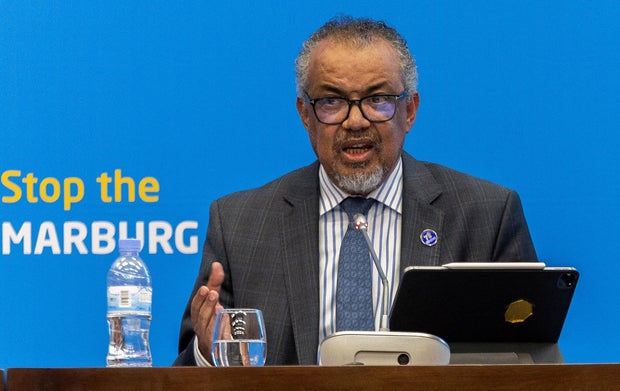Geneva — The World Health Organization said Friday it was reviewing its priorities in preparation for the withdrawal of its largest donor, the U.S., and stressed that it provides vital services that protect the country from health threats. President Trump on Monday signed an executive order directing the U.S. to withdraw from the WHO, a body he has repeatedly criticized over its handling of the COVID-19 pandemic.
“This announcement has made our financial situation more acute, and we know it has created significant concern and uncertainty for the WHO workforce,” the organization’s chief Tedros Adhanom Ghebreyesus said in a letter sent to WHO staff Thursday and seen by AFP on Friday.
He stressed that the United Nations’ health agency regretted the decision by the leader of the U.S. — by far the agency’s biggest donor — and hoped “the new administration will reconsider it.”
Jean Bizimana/REUTERS
“We are open to engaging in constructive dialogue to preserve and strengthen the historic relationship between WHO and the USA,” he said.
WHO spokesman Christian Lindmeier stressed to reporters Friday that the U.S. withdrawal would, in the agency’s view, be a mistake.
“WHO protects the U.S. with a sophisticated health intelligence system that works to detect, characterize and assess threats in real time,” he said. He pointed in particular to the current bird flu outbreak (H5N1), which has infected dozens of people and claimed one life in the U.S.
“We did have, actually, individuals contacting us already about the concern that this might now be a problem, as data are not coming forward any more and may not be shared,” Lindmeier said.
Tedros highlighted in his letter that the U.N. agency would now need to seek to identify its “key priorities.”
“We are reviewing which activities to prioritize with a reduced resource envelope,” he said.
He highlighted that the WHO had recently expanded its funding base, and would continue to rely on strong support from its member states and other sources.
But he acknowledged the need to “reduce costs and realize efficiency gains.”
Among other things, he said the agency was “freezing recruitment, except in the most critical areas,” and was dramatically cutting back on travel expenditures.
The U.S. withdrawal will take a year to complete, and American funding would remain in place for that period, under the organization’s rules. But Mr. Trump’s order also instructed U.S. federal government staff to stop working with the group — something U.S. health officials do on a wide range of health issues of global concern.
On “CBS Mornings Plus” earlier this week, CBS News chief medical correspondent Dr. Jon LaPook said health experts were already worried about the implications of the U.S. withdrawal.
“Public health experts who I’ve spoken to are concerned that we have a world leadership position with this and, if there is, for example, the next pandemic, it would help in terms of communication, to be able to be in communication with everybody around the world,” said LaPook.
While there are other avenues for communication, such as the outreach of medical societies and individuals, LaPook said “it’s nice to have a coordinated effort.”
The White House said in a statement Monday night that the U.S. was withdrawing from the WHO “due to the organization’s mishandling of the COVID-19 pandemic that arose out of Wuhan, China, and other global health crises, its failure to adopt urgently needed reforms, and its inability to demonstrate independence from the inappropriate political influence of WHO member states.”

